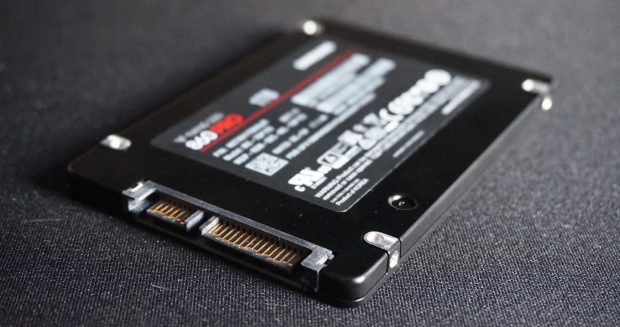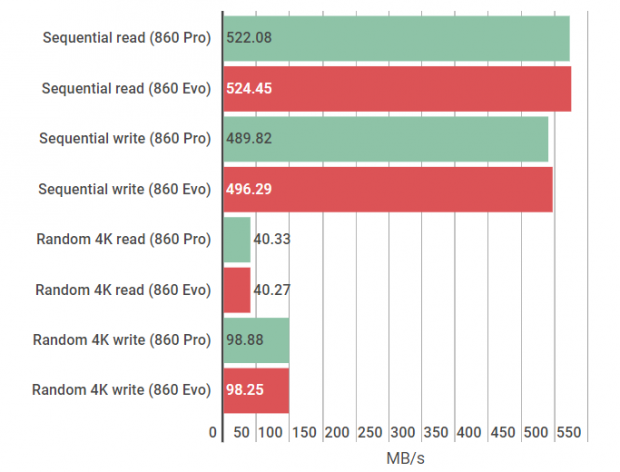
Samsung’s Pro vary of SSDs have at all times had a tough time within the face of their cheaper Evo counterparts. On the face of it, they’re meant to be sooner and longer-lasting – one of the best of the best SSDs, so to talk – however when the Samsung 850 Evo and 960 Evo proved to be just about simply as fast as their respective Pro siblings for lots much less money, they’ve grow to be more and more onerous to justify. Unless you frequently transfer a whole bunch of GBs of recordsdata round your PC every day, Samsung’s Evo SSDs are greater than sufficient in your typical gamer.
The 860 Pro isn’t any totally different. Speed-wise, Samsung claims it’s a fraction sooner than each the outgoing 850 Pro and incoming 860 Evo with a sequential learn velocity of as much as 560MB/s and a sequential write velocity of as much as 530MB/s, however in actuality they’re all just about similar. Why, then, do you have to take into account the 860 Pro? It’s all to do with endurance.
In a lot the identical method because the 860 Evo took the 850 Evo’s endurance to the subsequent stage, the 860 Pro goes one additional, providing as much as a mahoosive 4800 terabytes written (TBW) for the highest 4TB mannequin. That’s double what the 860 Evo provides at 4TB, and eight occasions greater than the 600 TBW you bought with the 4TB 850 Pro.
Lower capacities profit, too. Whereas earlier than you solely bought 150 TBW for the 256GB mannequin or 300 TBW for the 512GB and 1TB fashions of the 850 Pro, you now get 300 TBW as commonplace on the 256GB 860 Pro, 600 TBW for the 512GB version and 1200 TBW for the 1TB model. 2TB 860 Pro house owners, in the meantime, get 2400 TBW, an enchancment of virtually 2000 TBW over the 2TB 850 Pro.

Impressive stuff, however earlier than you get dazzled by the numbers, take into account this: whereas the 850 Pro gave you a beneficiant ten-year guarantee, the brand new 860 Pro solely offers you a five-year guarantee. Yes, you’ve bought considerably extra TBs to play with, but it surely nonetheless doesn’t appear almost pretty much as good worth.
Of course, very like I stated in my Samsung 860 Evo review, endurance is a difficult beast to truly take a look at if you haven’t been utilizing it continually over plenty of years. Therefore, what I can say about 860 Pro proper now’s just about restricted to quick it’s, which (because it seems) isn’t truly that a lot faster than the 860 Evo.
In reality, the 1TB 2.5in mannequin of the Samsung 860 Pro I had in for testing was nearly universally slower than the 2TB 2.5in 860 Evo I used to be despatched. I examined them with the identical system, too, which includes of a three.6GHz Intel Core i5-8600Okay processor, 16GB of Corsair Vengeance 3000MHz RAM and an Asus Prime Z370-P motherboard.
It wasn’t a lot slower, all advised, however take AS SSD’s 1GB sequential take a look at, which reads and writes 1GB of recordsdata in adjoining places on an SSD’s storage. Here, the 860 Pro managed 522.08MB/s learn and 489.82MB/s write. The 860 Evo, then again, pipped it to the publish on each events with speeds of 524.45MB/s learn and 496.29MB/s write. That’s not nice when the Pro’s meant to be the sooner drive and enabling the 860 Pro’s Rapid mode in Samsung’s Magician software program did little to enhance issues both, growing its learn velocity to simply 525.35MB/s and write velocity to 490.88MB/s.

The 860 Pro closed the hole in AS SSD’s 1GB random 4K take a look at, which reads and writes 1GB value of 4K chunks in random places on an SSD drive, however solely barely. This is a way more correct illustration of the speeds you’re prone to see in on a regular basis use, however even a number of retests solely noticed the 860 Pro produce a learn velocity of 40.33MB/s and write velocity of 98.88MB/s with Rapid mode left off, and 41.60MB/s and 100.80MB/s with Rapid mode enabled. The 860 Evo, by comparability, was only a hair’s breadth behind with 40.27MB/s and 98.25MB/s respectively.
CrystalDiskMark’s strenuous workstation-grade random 4K Eight-queue-Eight-thread take a look at painted the same image as effectively, with the 860 Evo matching the Pro on learn velocity, coming in at 403MB/s apiece, and edging forward on write velocity with 360MB/s versus the Pro’s 358MB/s.
Granted, it’s not an enormous distinction, however I’d count on extra given the veritable canyon between their respective costs. The 256GB 860 Pro, as an illustration, at the moment prices £126 / $140, whereas the 860 Evo is available in at simply £90 / $95. The hole solely will get extra pronounced as you go up in capability, too, with £63 / $80 separating the 512GB fashions, £123 / $150 sitting between 1TB drives and a hefty £226 / $300 dividing the 2TB sizes.
As a consequence, except you’re actually going to make use of all these additional 1000’s of TBW, you possibly can save your self a major chunk of change by choosing the 860 Evo as a substitute. You don’t must make any compromise on velocity, and the 860 Evo’s endurance remains to be gentle years forward of the rest, making it a lot better worth for cash.
In reality, these within the UK needn’t even spend that a lot, as Samsung’s equally zippy 850 Evo remains to be extensively accessible from around £80. That explicit boat has already sailed within the US sadly, with 850 Evo inventory rising more and more scarce, however UK folks ought to severely take into account choosing the 850 Evo if you wish to seize your self a cut price. After all, whereas the 850 Evo is probably not assured for as many TBW, you continue to get that tasty five-year guarantee, placing you in simply pretty much as good a place as its successor if it occurs to go kaput earlier than you attain your capability’s most TBW restrict. Either method, the 860 Pro simply isn’t value the additional money, so do your self a favour and (as soon as once more) get an Evo as a substitute.


